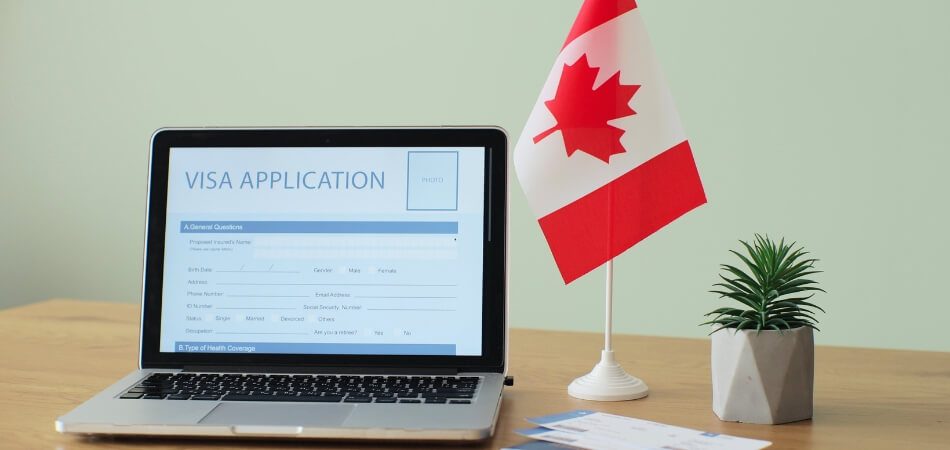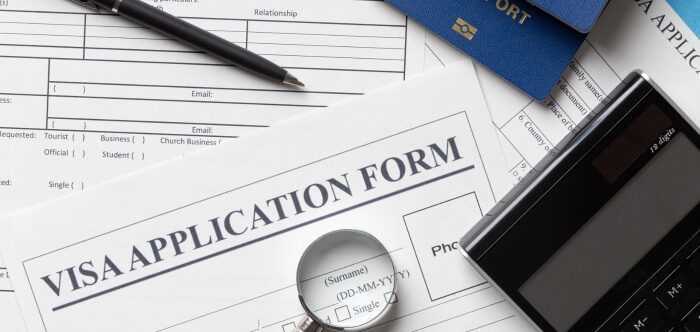Managing international travel can sometimes feel like an intricate dance, filled with forms, fees, and unfamiliar protocols. However, attending a Canadian conference from Uganda doesn’t have to be a daunting task. Wondering how to apply for a Canadian Conference Visa from Uganda? The process can be more straightforward than you might think.
Start by completing the application for a visitor visa (IMM 5257). Next, ensure you have essential documents like your invitation letter, passport, and proof of sufficient funds. With these in hand, all that remains is paying the visa fee and making your submission at the Visa Application Centre in Kampala. Don’t forget, though – some applicants may need to attend an interview.
Ready to unravel the mystery further? Dive into our detailed blog to ensure your visa application journey is smooth and hassle-free.
Significance of the Canadian Conference
Canada is renowned globally for hosting insightful conferences that bridge knowledge gaps across various industries. These gatherings are magnets for professionals, promoting international collaboration and raising innovation. From tech to healthcare, attendees acquire new skills and global perspectives, amplifying their professional growth.

Moreover, conferences held in Canada play a central role in economic development. They attract global experts, thereby enhancing the country’s reputation as a hub for thought leadership. As delegates spend on accommodations, dining, and tourism, local businesses thrive, boosting the nation’s economy.
Furthermore, the cultural exchange during these events is invaluable. Participants from diverse backgrounds share their experiences, bringing up mutual respect and understanding. This cultural richness enhances the depth and breadth of discussions, making Canadian conferences truly world-class.
Types of Canadian Conference Visas
Canada, with its rich tradition of hosting international events, offers various visas for conference attendees. Here’s a guide to understanding the different types available for those eager to participate.
Business Visitor Visa
Canada’s Business Visitor Visa is ideal for professionals attending conferences, meetings, or business conventions. This visa is short-term, typically valid for six months. It doesn’t allow employment but ensures meaningful professional interactions.
Visitor Visa (Temporary Resident Visa)
This visa serves dual purposes. For those wishing to attend a conference and then take some time to explore Canada’s scenic beauty, this visa is apt. With many conferences to attend in Canada, attendees can mix business insights with the joy of sightseeing. The visa duration, generally six months, provides ample time for both.
Electronic Travel Authorization (eTA)
An indispensable requirement for visa-exempt foreign nationals flying to Canada, the eTA is more than a formality. Linked electronically to one’s passport, this authorization ensures security and streamlined entry. Remember, it’s essential for boarding your Canada-bound flight, even if it’s not technically a visa.
Diplomatic and Official Visa
Designed for dignitaries, this visa facilitates the travel of diplomats or foreign representatives attending international summits or official conferences in Canada. Through this visa, Canada showcases its international cooperation spirit. It’s a testament to Canada’s global commitment and respect for international diplomacy.
Study Permit
At times, conferences might extend into intensive training or specialized courses spanning several months. In such cases, a Study Permit becomes necessary, allowing individuals to benefit from longer, in-depth learning sessions in Canada without any hitches.
Super Visa

Canada’s diverse visa offerings cater to various conference attendees, ensuring a hassle-free entry experience. Whether for business, study, or diplomatic reasons, there’s a suitable visa tailored to meet your needs.
How to Apply for a Canadian Conference Visa from Uganda?
Attending a conference in Canada from Uganda can be an enriching experience, opening doors to global networking and knowledge sharing. Yet, the visa application process might seem challenging. Knowing how to apply for a Canadian Conference Visa from Uganda is crucial in smoothing the process. This step-by-step guide aims to simplify your journey.
Step 1. Understand Visa Requirements
Before starting your visa application, it’s important to understand the specific type of visa required for attending a conference in Canada. Different visas apply to various purposes, such as business meetings or extended study sessions. Selecting the correct visa type is the first step toward a hassle-free process.
For conference attendees, a visitor visa is often the most suitable. However, ensure you confirm the purpose of your visit aligns with this category. Misidentifying the visa type could lead to unnecessary delays or complications.
By taking the time to research the correct visa, you’ll be better prepared to submit the right documents and avoid common mistakes. This approach helps streamline your application and boosts your chances of a successful outcome.
Step 2. Complete the Application Form (IMM 5257)
The IMM 5257 form is your gateway to securing a Canadian visitor visa, which is essential for attending conferences. It’s important to carefully fill out each section with accurate and up-to-date information to avoid any unnecessary delays in processing.
Even minor mistakes or missing details can result in your application being rejected or postponed. Double-check personal information such as your name, passport details, and travel dates. Be sure to include any relevant documentation as requested.
Taking the time to review the form before submitting it can save you from potential issues. If you’re unsure about a section, seek advice to ensure your application is as strong as possible.
Step 3. Assemble Essential Documents
Begin by collecting the key documents you’ll need for your Canadian conference visa application. These include your official conference invitation letter, a valid passport with enough blank pages, and a recent passport-sized photo. Each of these items plays a critical role in proving your eligibility for the visa.
Additionally, make sure to provide proof of sufficient funds for your stay. This can be bank statements, sponsorship letters, or any other evidence showing you can cover expenses like accommodation, food, and travel while in Canada.
Staying organized will make the application process much smoother. Having clear, well-prepared documentation helps ensure a faster review, reducing the risk of delays or additional requests from the visa office.
Step 4. Pay the Visa Processing Fee
When applying for your Canadian conference visa, paying the processing fee is an essential step. The fee amount depends on the type of visa you’re applying for, so it’s important to verify the current rate before proceeding. This ensures you don’t encounter any surprises along the way.
Once you’ve confirmed the fee, you can make the payment through an approved method, often online or at a designated bank. The process is typically straightforward, but always double-check payment instructions to avoid delays.
After completing the payment, don’t forget to keep a copy of your receipt. You’ll need this document when you submit your application, as proof that your fee was paid correctly.
Step 5. Submit at the Visa Application Centre in Kampala
Once your application is complete, the next step is to visit the Visa Application Centre (VAC) in Kampala. This is where you’ll submit all your documents, including your visa application form, passport, and any supporting paperwork. It’s essential to double-check that everything is accurate and complete.
Before heading to the VAC, ensure you’ve made copies of all important documents. This not only helps in case of any discrepancies but also ensures you have your records in order. Being well-prepared can save you a lot of time and stress.
At the VAC, you’ll be responsible for presenting a thorough and comprehensive application. The more organized you are, the smoother the submission process will be.
Step 6. Attend an Interview if Summoned
While most applicants won’t need to attend an interview, it’s essential to be prepared if you’re called. The Canadian visa officials may ask for an interview to verify details or gain a clearer understanding of your travel purpose.
If you are summoned, treat it as an opportunity to explain your reasons for attending the conference. Arrive on time, dress professionally, and carry all relevant documents that support your visa application. Be ready to answer questions confidently, focusing on your personal circumstances and how the conference aligns with your professional goals.
Remember, the interview is part of the process, so approach it calmly. Clear, honest responses will help reassure the officials about your genuine intent to attend.
Step 7. Await the Decision
Once you’ve completed and submitted your visa application, it’s time to wait for the decision. While waiting can be stressful, remember that the process takes time, and every detail of your application is carefully reviewed.
During this period, it’s a good idea to regularly check the status of your application online. Keep in mind that the processing time for Canada conference visa in Uganda can vary, so staying in touch with the Visa Application Center (VAC) for updates or further instructions is helpful. This ensures you’re aware of any potential issues or requests for additional documents.
If you receive a positive decision, congratulations! You’re ready to attend the conference in Canada. This is a key moment in your preparation, as it brings you closer to an exciting experience abroad.
By following these steps, you’re well on your way to securing a visa for your Canadian conference. Equip yourself with knowledge, patience, and thoroughness, and you’ll manage the process seamlessly.
Tips for Speeding Up the Canadian Conference Visa Application Process
Obtaining a Canadian conference visa takes time and effort, there are methods to speed up the procedure. The trip can be made more efficient with careful planning and accurate execution. Here are some key tips to consider.
Start Early
Time is of the essence. Beginning your application well in advance minimizes stress and accommodates unforeseen delays. More lead time means flexibility, allowing for any required adjustments or corrections.
Ensure Accuracy in Form IMM 5257
Mistakes can cause setbacks. Complete the “Application for Visitor Visa” (IMM 5257) with utmost accuracy. Double-check details to prevent discrepancies, as errors might prompt additional scrutiny or resubmission.
Compile Documents Methodically
Organization is vital. When gathering the documents required for traveling from Uganda to Canada, arrange them systematically, ensuring each is up-to-date and relevant. Having a clear, organized set of paperwork can significantly speed up the evaluation process.
Opt for Online Applications
Digital is faster. Submitting your application online can be quicker than paper-based methods. It’s efficient, reduces chances of document loss, and provides real-time application status updates.
Attend Biometrics Promptly
If biometrics are required, don’t delay. Schedule and complete your biometrics appointment as soon as you receive the invitation. Timely biometric submission ensures your application remains on track.
Maintain Open Communication
Be proactive in your communication. If the Visa Application Centre reaches out for additional information, respond promptly. Efficient communication can help in expediting the decision-making process.
By following these practical tips, you’ll be better positioned to manage the Canadian Conference Visa application process with agility and speed. Remember, preparation is key, and every small step taken efficiently brings you closer to your Canadian conference experience.
Pros and Cons of Attending Canadian Conferences
Canadian conferences are a hub for knowledge exchange and networking, attracting professionals worldwide. However, like any experience, they come with both advantages and drawbacks. Here’s a snapshot of both sides:
Pros
- Networking Opportunities: Connect with global professionals, opening doors to collaborations and partnerships.
- Skill Enhancement: Workshops and sessions offer the latest insights and skill-building techniques.
- Cultural Exchange: Engage with diverse attendees, broadening cultural understanding and perspectives.
- Exploring Canada: A chance to experience Canada’s scenic beauty and rich culture alongside professional commitments.
- Global Exposure: Gain insights into global market trends, research, and innovative solutions.
- Professional Recognition: Presenting on such platforms can boost one’s professional standing and credentials.
- Access to Resources: Often, attendees receive exclusive research papers, tools, and further learning opportunities.
Cons
- Travel Costs: International travel, accommodation, and other related expenses can be hefty.
- Time-Consuming: Dedication of several days, impacting regular work or personal schedules.
- Visa Challenges: The visa application process might be daunting for some international attendees.
- Overwhelming: Large-scale conferences can be daunting, making it challenging to absorb all information.
- Potential Language Barriers: While English is predominant, nuances and accents might pose comprehension challenges for some.
Weighing the pros and cons can help in making an informed decision about attending Canadian conferences, ensuring that the experience is both professionally rewarding and personally fulfilling.
Frequently Asked Questions
Can I get a Canadian visa if my application is rejected once?
Yes, you can reapply for a Canadian visa if your application is rejected. Make sure to carefully review the reasons for the rejection and address them in your new application. Improving your documents and meeting all the requirements increases your chances of approval.
How much does it cost to apply for a Canadian conference visa from Uganda?
The cost to apply for a Canadian conference visa from Uganda is typically around 100 CAD, plus a biometrics fee if required. Fees may vary, so it’s best to check the official Government of Canada website for the most up-to-date information before applying.
Can I attend multiple conferences on the same Canadian visa?
Yes, you can attend multiple conferences on the same Canadian visa, as long as your visa remains valid for the duration of all the events. Just ensure that your visa type allows for multiple entries if you plan to leave and re-enter Canada.
How long does it take to process a Canadian conference visa from Uganda?
The processing time for a Canadian conference visa from Uganda typically takes several weeks. However, it can vary based on factors like application volume. It’s a good idea to apply early and regularly check the status online to avoid any last-minute delays.
Is an invitation letter mandatory for a Canadian conference visa?
Yes, an invitation letter is usually required when applying for a Canadian conference visa. It helps confirm your purpose of visit and is often requested by immigration officials. Ensure the letter is from the conference organizer and includes key details about the event.
Bottom Line
It’s fascinating to take part in a conference in Canada, which provides attendees with plenty of advantages like international networking, talent development, and cultural immersion. But before enjoying these benefits, it’s vital to comprehend the visa application procedure. The question “How to Apply for a Canadian Conference Visa from Uganda?” is often asked, indicating the high level of interest that people throughout the world have in Canada’s premier conferences.
The step-by-step guide provided clarifies this process, ensuring applicants from Uganda and other nations are well-prepared and can manage the visa procedure with confidence. Additionally, the insights into the significance of Canadian conferences and the pros and cons of attendance give a comprehensive view of what one can expect.
While there are challenges to overcome, such as visa applications and potential travel hurdles, the myriad of benefits offered by Canadian conferences makes the effort worthwhile. So, whether you’re aiming for professional growth, networking, or cultural experiences, Canada’s conferences are a promising avenue to explore.







Is possible to request for a work permit using a visitors visa?
Thank you for your question, Rebecca. In Canada, a visitor visa alone does not allow you to apply directly for a work permit. To qualify, you must first secure a valid job offer from a Canadian employer, and in most cases the employer also needs a Labour Market Impact Assessment (LMIA). Once you have these, you can submit a work permit application through IRCC.